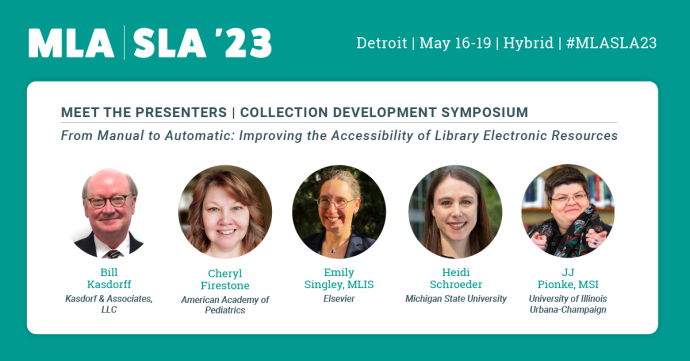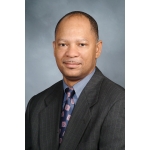Every week until MLA | SLA '23 in Detroit, we will profile the experts leading each of the six Collection Development & Resource Sharing Symposium sessions by sharing their answers to questions about themselves and their session.
We start the series with the presenters and moderators of From Manual to Automatic: Improving the Accessibility of Library Electronic Resources: Bill Kasdorf (BK), Principal, Kasdorf & Associates, LLC, Cheryl Firestone (CF), Senior Manager, Digital Publishing of the American Academy of Pediatrics, Emily Singley (ES), Vice President, North American Library Relations, Elsevier, Heidi Schroeder (HS), Accessibility Coordinator, Michigan State University (MSU) Libraries, and JJ Pionke (JP), Applied Health Sciences Librarian, University of Illinois, Urbana-Champaign.
Join them for their session on May 19, 1:00-2:30 p.m., eastern time. You’ll leave the session with a deeper understanding of the current state of electronic resource accessibility, knowledge of ways libraries can improve the accessibility of their resources, and fresh enthusiasm and inspiration for making your electronic resources more accessible.
What are you most looking forward to seeing/eating/experiencing in Detroit?
BK: I live in Ann Arbor, Michigan, and I have a daughter who's a curator at the Detroit Institute of Arts. If this was a typical visit to Detroit, I’d answer, "Getting an extra visit with my daughter," but she'll be out of town. My best advice to people new to Detroit is: Visit the DIA. It’s one of the top ten comprehensive art museums in the country and the crown jewel of Detroit.
CF: This is my first time attending MLA. I am looking forward to getting more insight into what’s on the collective mind of the attendees. It’s a great opportunity to hear more from this incredibly important group.
ES: I’m looking forward to seeing Detroit for the first time and getting some good Detroit-style pizza!
HS: I LOVE Detroit! Its people are the best! My husband and I both went to grad school at Wayne State and lived in the city while getting our degrees. We come back frequently, and I continue to be amazed at how much more there is to do, eat, and see in Detroit since then. A *few* of my favorite places are: the DIA, Eastern Market, Comerica Park, Sister Pie, the Dequindre Cut & Riverfront, and the Historic Indian Village where my sister lives.
JP: I’ve missed attending the MLA Annual Conference in person, and I am looking forward to seeing people face-to-face, even with extra pandemic precautions.
For publishers: What’s an interesting fact about publishing that librarians would be surprised by?
BK: I'm a consultant on the FRAME/EMMA project to make education materials accessible and shareable, not a publisher, but I’ll take a shot at this. Like most people, many librarians don't have a clear understanding of the number of parties involved in a publishing workflow or that the publisher is rarely the party that creates the files that constitute the articles or books libraries receive. Their vendors do that. I should quickly add that publishers typically have an even weaker understanding of what librarians do. It would be a revelation to many publishers to realize how much more technologically sophisticated librarians are than most publishers.
CF: We care about our users more than you know! We are consistently striving to improve user experience, particularly in digital formats. Librarian input is highly valuable to us as a publisher.
ES: There is a lot of behind the scenes work that goes into publishing high quality content, from editing and managing peer reviewers, to sustainability, accessibility, security, and archiving. And, we rely on our users to work with us to make sure we are creating content that meets all their needs!
For librarians: What’s an interesting fact about libraries that publishers would be surprised by?
HS: We’re more than traditional resources (although those are important too). At the Michigan State University Libraries, we offer our users everything from assistive technology, a seed library, a MakerSpace, and a Digital Scholarship Lab, to cool exhibits from our Special Collections & Archives, therapy dogs to relieve stress, video game labs, and more!
How did you get started in libraries or publishing?
BK: I've been involved in publishing my whole career, starting in college when I chaired a student committee that published poetry and an award-winning literary magazine. In my conference presentations, I often start with a 1971 snapshot of me standing next to a Vandercook proof press on which I'm printing a hand-set poetry chapbook.
CF: I’ve been in “publishing” since I was the editor of my 5th grade newsletter, The Longhorn Gazette. I grew up in an era when we would go to the library to study, read, and explore the world.
ES: I started in libraries because I wanted to help academic learners, teachers, and researchers have better access to scholarly content. I recently moved to publishing, and I am pleased to be able to bring a librarian perspective to my work.
HS: I grew up in a small, rural area of Michigan, and, from a very early age, libraries and reading helped expand my horizons and perspective in so many ways that I’m eternally grateful for.
JP: I stumbled into it. I needed a change. I was an adjunct professor of English, and my librarian colleagues basically said, you’d make a great librarian so I decided to give it a try.
What’s the most rewarding part of working with librarians or publishers?
BK: Getting to work with a lot of very smart people who are doing really good things!
CF: As a publisher, knowing exactly what our customers need from us and then providing it. There is no better feeling than exceeding someone’s expectations of our products and services.
ES: Working with librarians keeps me closely connected to our users. The most rewarding part is being able to partner with them to improve the user experience for everyone who uses our platform and services.
HS: I feel so lucky to work with many motivated, incredibly intelligent, energetic, kind, and empathetic colleagues. The diverse actions and impacts that these colleagues have on our many, many users is incredibly rewarding.
JP: When publishers finally “get it” on why accessibility matters and how their content needs some remediation.
What’s the main thing you hope participants will take away from your contribution to the session?
BK: The importance of making content accessible--and sharing the work.
CF: Accessibility means that all people can perceive, understand, navigate, and interact with electronic information and be active, contributing members of the digital world. Many publishers are playing catch-up with WCAG guidelines. I hope people will take away that web accessibility efforts are improving, but we’re not all there yet. We now have an awareness that providing content in accessible formats is the right thing to do. And it’s never wrong to do the right thing.
ES: Accessibility needs to be built into our development processes from the beginning--not an “add-on” but integral to the design of any new feature or service. We are committed to making content universally accessible. We’ve come a long way, but there is still much work to do.
HS: As a panelist representing the Library Accessibility Alliance--how effective libraries can be when we use our collective knowledge, resources, and power to collaborate for positive change.
JP: I hope that people take away the fact that there’s a lot of content out there that is not accessible, and, because it is not accessible, a lot of patrons are missing out on amazing resources. Likewise, publishers are missing out on patrons because of inaccessibility.




